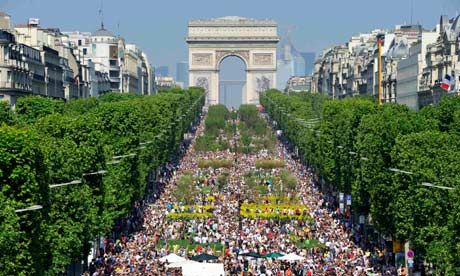 |
| Visitors stroll on the Champs-Elysees avenue in Paris. The road has been turned into a huge farm with plots of plants, trees and flowers laid out on Paris' most famous avenue to focus attention on France's crisis-hit agriculture. (Fred Dufour) |
|
One of Paris's main thoroughfares, the
Champs-Elysees, has been covered in earth and turned into a huge green
space in an event staged by young French farmers.
They want to highlight their financial problems, caused by
falling prices for agricultural produce.
Plants, trees and flowers were brought in by lorry overnight to
transform the avenue into a long green strip.
More than a million people are expected to visit over the next
two days.
The event, which cost 4.2m euros (£3.6m; $5.3m) to stage, has
been organised by the French Young Farmers (Jeunes Agriculteurs) union
over the holiday weekend in France.
It will serve as a showcase of farm production from sheep
breeding to crop growing.
The union, which represents some 55,000 farmers under the age
of 35, wants to impress on the public - and the government - the efforts
required to produce what goes on the table.
"It's about re-establishing contact with the public about what
our profession is and what they want from it," William Villeneuve,
president of the Jeunes Agriculteurs, said on Friday.
"Do they want the cheapest products in the world or do they
want products that pay producers?" he added.
Monumental
Only in France are you ever likely to see such a monumental
mobilisation of creativity and resources, all in the cause of that
beloved but beleaguered figure: the French farmer, says the BBC's Hugh
Schofield in Paris.
Overnight, 8,000 plots of earth have been brought into central
Paris, and on Sunday morning, from the Arc de Triomphe down, the
Champs-Elysees is one vast green space.
Some 150,000 plants have been installed - including 650 fully
grown trees - representing agricultural produce from the marshes of the
Camargue to the plains of Picardy, our correspondent adds.
Visitors will be able to buy boxes of the earth for their own
gardens.
BBC News

